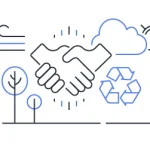
What do you think is the biggest health threat to humanity?
Heart disease? Obesity? Infectious diseases like COVID-19 or HIV? Cancer? If you guessed any of these then you are incorrect. According to the World Health Organization report in 2019, the biggest heath threat is in fact climate change!
Climate change can cause extreme, life threatening heat, extreme weather conditions with rising sea levels, air and water pollution, reduced food and water quality, increased allergens and increased infectious disease transmission.
Since the pre-industrial age (the end of the 19th century), the global temperatures have been steadily rising, with the rate of increase most marked over the past 50 years alone. On average, the temperature has risen by 1 degree Celsius. And although this may not seem like a significant rise, the temperatures recorded in the last decade have been the highest we have ever seen!
What is to blame for this rise you may ask? The biggest factor at play here is none other than air pollution and greenhouse gas emissions.
According to a recent study published in the in Proceedings of the National Academy of Sciences in January 2023, the global temperatures are set to rise by a whopping 2 degrees Celsius by 2050.
n December of 2015 at the United Nations Climate change conference, 196 parties, including the Republic of Ireland, agreed to sign ‘The Paris Agreement’. This is a legally binding international treaty on climate change and principal goal is to halt “the increase in the global average temperature to well below 2°C above pre-industrial levels” and implement strategies “to limit the temperature increase to 1.5°C above pre-industrial levels.”
Ireland implemented the Climate Action and Low Carbon Development (Amendment) Act in 2021. This outlines that Ireland is now legally bound to achieve net-Zero emissions by no later than 2050, and a 51% reduction in emissions by 2030. The Act provides the framework by which Ireland can achieve its international and EU climate commitments becoming leaders in addressing climate change.
What is carbon neutrality?
Achieving carbon neutrality simply means that there is a balance between how much carbon is emitted and how much is being absorbed from the atmosphere. Removing carbon dioxide from the atmosphere and then storing it in ‘carbon sinks’ is known as carbon sequestration. The natural carbon sinks are trees, soil and the ocean. However, there are also artificial carbon sinks including landfills.
It is estimated that natural sinks remove between 9.5 and 11 gigatonne of CO2 per year. Annual global CO2 emissions reached 37.8 gigatonne in 2021. Unfortunately, currently there are no artificial carbon sinks that are able to remove carbon from the atmosphere on a big enough scale scale to fight global warming. Although, research is ongoing to develop these interventions.
So how does a country become Carbon Neutral?
Good question!
According to the world population review 2023, Comoros, Gabon, Guyana, Madagascar and Niue are the only Carbon neutral countries. With Bhutan, Panama and Suriname even achieving Carbon negative status. Meaning that their rate of carbon sequestration outweighs their production!
Carbon neutrality can be achieved by primarily reducing emissions, most of which come from the burning of fossil fuels for energy. This may look like switching to electric and hybrid vehicles, using solar energy to power homes or encouraging business to use less packaging or reusable packaging where possible.
Additionally, focus should be placed on carbon sequestration in carbon sinks.
As trees grow, they lock in carbon dioxide. In Europe however, Ireland has the lowest level of forest cover (<11% versus 40% average) and the lowest level of native forestry in Europe (<2%). Thus,
planting forests are a vital part of Ireland’s Carbon neutral path. Efforts should also be made to protect Irish peat bog habitats of which only 1% now remain.
Using these measures among others, it is expected that Ireland will soon join the list of carbon neutral countries by 2050.

My Thoughts
When the station manager at 92.5 Phoenix FM, Mr. Brian Greene, asked in our team WhatsApp group for a volunteer to write an article on Ireland becoming Carbon neutral, I did not immediately jump at the opportunity. However, I thought that the topic was quite interesting. As a young male coming from the Caribbean, I never really had much thought on global warming. Its damaging effects however, have been well-documented.
To reach this goal of carbon neutrality, the onus is not only on the government, but on the general public and major companies that use fossil fuels as well.
While researching this topic, I came across the damaging outcomes if this target is not met. Ireland in particular, will be affected by rising sea levels and may even be under water by 2050 as per one article!
Alarming!
So, how can you as an individual help meet this target?
In a nutshell
You can minimize your carbon footprint and help the environment in many different ways. Whether you are at home, in work, at school, or while you are traveling, you can implement small changes, which can add up. For example, using reusable cups for your take-away coffee, eating less animal products, shop at local farmers markets, cycling or using public transport or opting to work from home if that option is available for you etc.
As a resident of this beautiful country, I believe these targets and goals are important for the livable future. Start making small changes today!
Article by Stephen ‘Snuffy’ Taylor
Phoenix FM’s manager Brian Greene went on the air Tuesday the 25th of July to talk with Gráinne and Kelly about the importance of Carbon Neutrality. This article can be found here.




Pingback: PhoenixFm goes Carbon Neutral! - 92.5 Phoenix FM